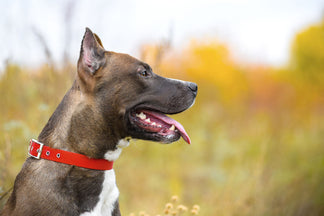This week we are featuring the Boxer in our Getting to Know Your Dog Breed series. The Boxer is part of the Working group of the AKC and ranks just outside the top ten at #11.
Life expectancy: Boxers have a fairly short life expectancy of only 8 – 10 years.
Size: They are a medium to large sized, stocky dog, weighing in around 65-80 pounds and standing between 21-25 inches tall.
Color: The standard coloring for Boxer is beige, brown or brindle with white or black markings.
Origins: The Boxer is thought to be a descendent of a German breed called Bullenbeisser or ‘bull-baiter’. They were used as a hunting dog to run down bears, boars and bison. Eventually, through further breeding with mastiffs, bulldogs, great danes and even terriers, the Boxer as we know them today emerged. They were the first known police dogs and were also used to control livestock by butchers.
Personality: Boxer’s are fun-loving and playful breed but also very loyal and protective to their family. They are particularly fond of children and watch over them closely. Boxers are intelligent, so proper and consistent training is essential to keep them happy, healthy and well-behaved. They can become quite destructive if their mental stimulation and exercise needs are not met.
Health Issues: Boxer’s have a thin coat and do not easily tolerate hot or cold weather. Be sure to keep them indoors when the weather is unsuitable. The most serious of the Boxer’s health issues are a genetic predisposition for various heart diseases including aortic stenosis, atrial septal defects, and dilated cardiomyopathy. Treating these conditions should be proactive and preventative. When buying a Boxer puppy, seek out a breeder familiar with these issues who practices prevention in their breeding program.
Boxers are also susceptible to several eye conditions, including retinal atrophy and cherry eye, or protrusion of the tear duct.
Bloat, or gastric torsion is also common among Boxer’s so be aware and watchful for those symptoms.
Fitness/energy level:
Boxers are high energy and need a good daily dose of exercise and play. As we mentioned, they can become destructive if bored, so be sure and manage their energy levels appropriately. As a “working dog”, Boxers like to have a job, so agility or other dog sport is a great outlet for them. If you can find a class in herding, even better as that behavior is inherent in their genes.
Like other dogs with short snouts, be aware of the Boxer’s brachycephalic issues and monitor their exercise to prevent any problems with breathing or overheating.
Native foods for the Boxer:
Wild
boar
Duck
Trout
Cabbage
Good foods to feed your Boxer:
Taste of the Wild™, Southwest Canyon Canine Formula with Wild Boar
Nutram™, Total T23 Grain Free Turkey, Chicken & Duck
Horizon™, Legacy Adult
Fun facts about the Boxer:
- There are several stories on where the name Boxer originated. Our favorite is that it refers to the way the breed spars, like a prizefighter, with their front paws when playing or defending themselves.
- Boxer’s are champion snorers.
- Brandy, owned by John Scheid of St. Clair Shores, Mich., holds the Guinness Book of World Records for the longest tongue measuring in at 17-inches long!
Sources:
http://www.akc.org/dog-breeds/boxer/
https://www.petcarerx.com/article/boxer-breed-health/358
https://pets.thenest.com/common-boxer-breed-medical-problems-3866.html




 General
General
 General
General
 General
General
